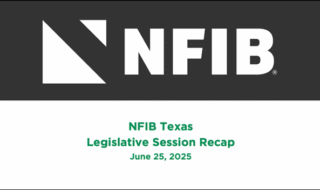June 30, 2025
Governor signs 2025-2026 state budget. NFIB to meet with CARB
Happy Fourth of July. Welcome to the June 30-July 4 edition of the Main Street Minute from your small-business-advocacy team in Sacramento.
Small Business Groups to Meet with CARB
NFIB will be one of the groups present at a July 10 meeting with Dr. Steven Cliff, executive officer of the California Air Resources Board (CARB), set up by the agency to hear the concerns of small and ethnic business groups.
This will be an opportunity for representatives of the groups to comment on the issues under CARB’s purview, such as its 2022 Scoping Plan for Achieving Carbon Neutrality, appliance reporting, forklift rules, and how its Nov. 8, 2024, update to its Low Carbon Fuel Standard (LCFS) is working.
Have something you would like NFIB to ask or relay a comment you want to make on a matter? Send NFIB California State Director John Kabateck and email, john@kabstrat.com. The July 10 meeting will be held at CARB headquarters in Sacramento from 1 p.m. to 3 p.m.
Background
According to the CARB news release hyperlinked above, “The LCFS is designed to provide the most cost-effective path to support clean fuels and infrastructure. Affordability remains a key consideration for the Board, and it has directed staff to assess any impacts and potential mitigation from today’s adopted amendments on retail gasoline prices every six months and to submit an annual report beginning one year from the effective date of these amendments, and to collaborate with the California Energy Commission in that effort.”
The LCFS is getting some pushback, as this June 27 guest editorial in The Orange County Register by Tim Anaya of the Pacific Research Institute, explained.
“Green mandates like the Low Carbon Fuel Standard impose huge costs on working class and minority communities and those living in inland and central California. These are core constituencies for Democratic lawmakers at risk of losing their seats.
“Their worry grows when they read the Air Resources Board’s own assessment forecast that the new standard could raise gas prices by 47 cents per gallon. A recent USC study found that Newsom’s green mandates — which also triggered the forthcoming closure of two major state refineries — could see state gas prices surpass $8 per gallon by 2026.”
From State Director John Kabateck
“Rules promulgated by state agencies such as CARB are not subjected to legislative or gubernatorial changes, so it is vitally important to establish a collegial working relationship with them. I want to again commend Judy Nottoli, CARB’s small business ombudsmen, and Dr. Cliff for making the time hear from Main Street enterprises.”
State Budget
July 1 was the first day of the 2025-2026 Fiscal Year in California. After signing an initial $321 billion spending plan on Friday, June 27, the governor signed another state budget on June 30 that contained measures refoming the California Environmental Quality Act (CEQA), without which would have imperiled the rest of the state budget.
It was the “Signing of landmark package to cut red tape, fast-track housing, and infrastructure forthcoming,” according the governor’s news release. The Bay Area News Group offered a more sober, less-cheerleading analysis of the budget, which it called balanced by “a combination of money transfers, reserves and deferred payments.”
Of note in the News Group’s report, “The budget agreement comes with a catch: it hinges on the ability of lawmakers to pass substantial reforms to the California Environmental Quality Act by Monday night — a priority for Newsom this session. Lawmakers were advancing legislation to do so on Friday, setting up a potential showdown. CEQA has paralyzed housing and infrastructure construction in much of California.”
More on the state budget as it relates to small business in future Main Street Minutes.
The Legislature
Last week’s Main Street Minute highlighted the 11 bills of greatest importance as a couple of big deadlines approach. The Main Street Minute will keep its members updated on their fate.
What Others Are Reporting
Dan Walters of CalMatters writes, “’When we talk about the things that are keeping me up at night, it really comes down to what is going to keep our members in business,’ Shannon Douglass, president of the California Farm Bureau, said this month during a gathering of industry leaders.
“She cited a federal census of agriculture which revealed California has lost 20% of its farmers in the last decade. The industry is at a tipping point, she declared. She also pointed to a study by researchers at Cal Poly-San Luis Obispo that detailed rising costs of producing lettuce in the Salinas Valley due to government regulations. It found that costs of environmental, labor and food safety regulation are $1,600 per acre, up 63.7% since 2017, while income from lettuce has been virtually stagnant.
“’We’re sitting here in California and getting our brains beat in with costs that are through the roof and going up against my competitors in the East Coast paying $8 to $9 an hour for labor, and we’re dealing with the same customers,’ said Mike Way, a bell pepper producer in the Coachella Valley. ‘What’s my choice? My choice is to shrink my acreage and go elsewhere.’”
Till the Soil or Toil for Government?
Last Wednesday (June 25), State Controller Malia Cohen released the payroll data of cities and counties as of 2024.
“The newly published data includes 461 cities and 55 counties,” she said in a news release. “The City of Hayward had the highest average city employee wage in California, followed by the cities of Atherton, Beverly Hills, San Francisco, and Half Moon Bay. The counties with the highest average employee wages were Santa Clara, Los Angeles, Contra Costa, Alameda, and Sonoma.”
Half Moon Bay?
Little Half Moon Bay (Pop. 11,000) in San Mateo County, better known to non-natives as home of the Pumpkin Festival and famous producer of artichokes, is generous to the people who work for it. According to the secretary’s data, it paid $6,531,659 in total wages in 2024 to its 54 employees, and $720,937 in total retirement and health contributions. And it doesn’t have its own police department.
Calendar
— July 4: Independence Day. Legislature not in session
— July 10: NFIB and other small and ethnic business groups to meet with top officials from the California Air Resources Board (CARB) about environmental regulations
— July 18: Last day for policy committees to hear and report bills
— July 18: Summer recess begins upon adjournment
— July 24: 1 p.m. meeting with Assemblymember Juan Alanis for Stanislaus and Merced county-area NFIB members. Location to come.
— August 18: Legislature reconvenes from summer recess
— August 26: NFIB California’s Leadership Day at the Capitol
— August 29: Last day for fiscal committees to hear and report bills to the floor
— September 1: Labor Day. Legislature not in session
— September 12, 2025-January 5, 2026: Interim recess of the 2025-2026 session of the California State Legislature
— October 15: Last day for governor to sign or veto bills passed before September 12.
National
— NFIB Webinar, Five Most Frequent HR Mistakes and How to Avoid Them, this Wed., Jul 2, 2025, Noon ET. RSVP Here.
— On the 64th episode of the “Small Business Rundown” podcast two NFIB members attending NFIB’s annual Fly-In event in Washington, D.C. explain why they took time away from their business to come to Capitol Hill to meet with lawmakers. Listen here.
Highlights from NFIB Federal Government Relations Principal Josselin Castillo’s weekly report
— The Senate continues reconciliation work ahead of a quickly approaching self-imposed July 4th deadline for passage of the tax bill. The language is subject to change as negotiations continue and the Byrd rule process plays out. NFIB FGR will monitor closely, analyze new language and issue statement as appropriate.
— The NFIB Research Center released a new Small Business and Technology Survey providing insight into how small business owners incorporate new technologies into their business operations.
— Director of Research and Policy Analysis Peter Hansen published an op-ed in Real Clear Markets on the importance of the Small Business Deduction for Main Street businesses.
Next Main Street Minute: July 7. All Main Streets Minutes can be found on the NFIB website here. Pull down the California tab in the upper-right-hand corner.
NFIB is a member-driven organization advocating on behalf of small and independent businesses nationwide.
Related Articles














